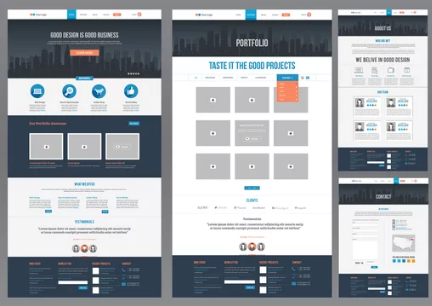A Step-by-Step Guide to Website Redesign

Does your website feel a bit like a dusty attic – cluttered, outdated, and in desperate need of a refresh? If so, a website redesign might be just what you need. A well-executed redesign can breathe new life into your online presence, improve user experience, and ultimately boost your business goals. But where do you begin? Here's a comprehensive checklist to guide you through the website redesign process, from planning to launch:
1. Define Your Goals and Target Audience
Before diving into design details, take a step back. What are your goals for the redesigned website? Do you want to increase brand awareness, boost sales, or generate leads? Having a clear understanding of your goals allows you to tailor the website design to achieve the desired outcomes. Additionally, identify your target audience. Understanding their demographics, online behavior, and preferences is crucial. A website that resonates with your ideal users is more likely to convert visitors into customers.
2. Analyze Your Current Website
Take a critical look at your existing website. What's working well? What areas need improvement? Is the navigation user-friendly? Do the visuals align with your brand identity? Are loading speeds slow? Analyzing your current website performance helps identify areas for improvement and informs the direction of the redesign. Consider using website analytics tools to gather data on user behavior and website traffic.
3. Research the Competition
Know your landscape! Spend some time browsing the websites of your competitors. See what they're doing well in terms of design, user experience, and content. This competitive analysis can spark inspiration for your own website redesign and help you identify areas where you can stand out.
4. Partner with a Website Designer
While it's possible to attempt a DIY website redesign, collaborating with a skilled Singapore web designer is highly recommended. A professional website designer can translate your vision into a visually appealing and user-friendly website that is optimized for search engines and mobile devices. Look for a web designer with experience in your industry and a portfolio that showcases work you admire.
5. Content is King (and Queen)
High-quality, engaging content is vital for any website. During the redesign process, take stock of your existing content and identify areas for improvement or creation of new content. Ensure your content aligns with your target audience's needs and is optimized for search engines. Remember, fresh, informative content keeps users engaged and coming back for more.
6. Prioritize User Experience (UX)
Your website should be a joy to use, not a frustrating maze. Focus on creating a user-friendly experience (UX) with clear navigation, intuitive design elements, and fast loading times. A website designer can help ensure your website is easy to navigate and provides a seamless browsing experience for all users.
7. Design with Mobile in Mind
Remember, the majority of website traffic likely comes from mobile devices. A responsive website design is crucial. This ensures your website automatically adjusts its layout and elements to fit the screen size of the device being used. Your website designer can create a responsive website that looks great and functions flawlessly on desktops, tablets, and smartphones.
8. Testing is Key
Before launching your redesigned website, thorough testing is essential. Test the website on different devices and browsers to ensure functionality and identify any potential bugs. Consider user testing – recruiting real users to navigate the website and provide feedback. This helps identify any areas for improvement before you go live.
9. Launch and Beyond!
Congratulations! Your redesigned website is ready for the world. Promote your launch across your marketing channels and social media platforms. However, the work doesn't stop there. Monitor your website analytics to track user behavior and website performance. A successful website redesign is an ongoing process, so be prepared to make adjustments and refinements based on data and user feedback.
By following these steps and partnering with a skilled website designer, you can transform your website redesign project from a daunting task into a successful endeavor. Remember, a well-designed website is a powerful tool for attracting new customers, building brand loyalty, and achieving your long-term business goals. So, take a deep breath, embrace the redesign journey, and watch your website blossom into a digital hub that thrives in today's online world.
Sponsor
Zoeken
Sponsor
Categorieën
- Questions and Answers
- Opinion
- Motivational and Inspiring Story
- Technology
- Live and Let live
- Focus
- Geopolitics
- Military-Arms/Equipment
- Beveiliging
- Economy
- Beasts of Nations
- Machine Tools-The “Mother Industry”
- Art
- Causes
- Crafts
- Dance
- Drinks
- Film/Movie
- Fitness
- Food
- Spellen
- Gardening
- Health
- Home
- Literature
- Music
- Networking
- Other
- Party
- Religion
- Shopping
- Sports
- Theater
- Health and Wellness
- News
- Culture
Read More
The idea of undergoing a breast uplift abroad
When you look deeper into what contributes to the overall breast uplift cost, the surgeon’s...
True reasons Middle-Eastern countries not interested in hosting Palestinians as refugees
The reluctance of most Middle Eastern countries to host large numbers of Palestinian refugees is...
Discover the Convenience of Business Trip Massage Services in the Metropolitan Area
In today’s fast-paced world, stress and tension are inevitable. Whether it’s due to...
Smart Kitchen Appliances Market Future Scope: Growth, Share, Value, Size, and Analysis
"Smart Kitchen Appliances Market Size And Forecast by 2032
According to Data Bridge Market...
Traditional online casinos often require players to wait several days
Crypto casinos are rapidly becoming a popular choice among online gamblers, offering an...
Sponsor

